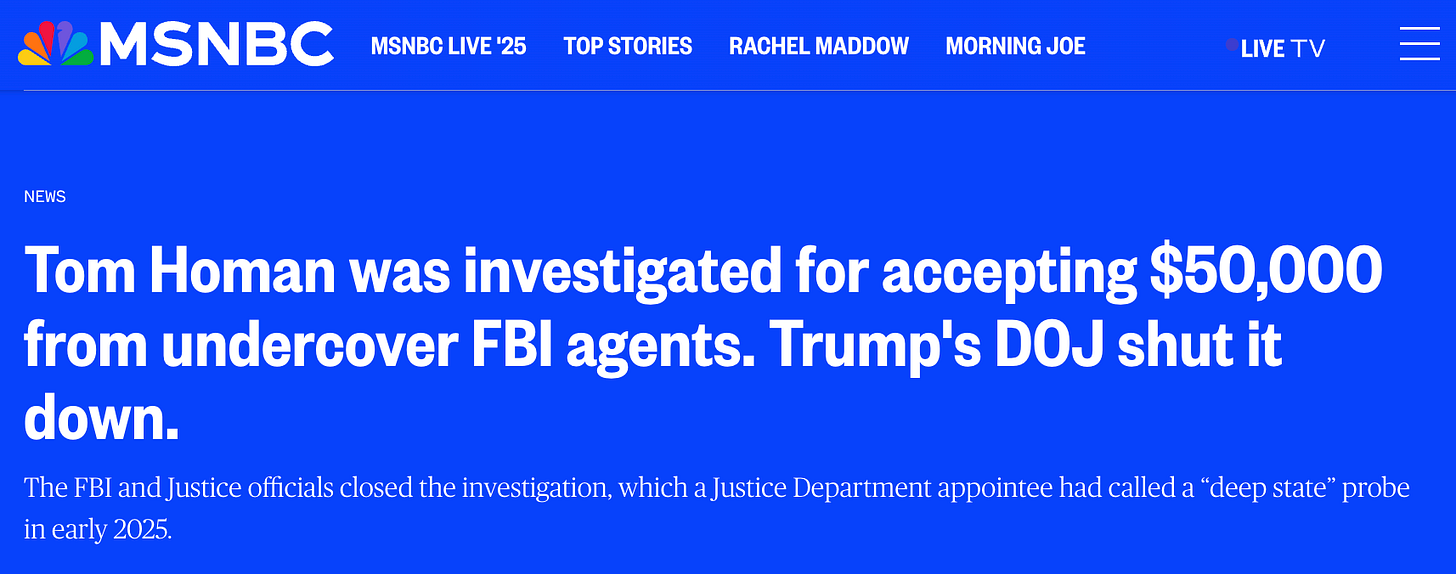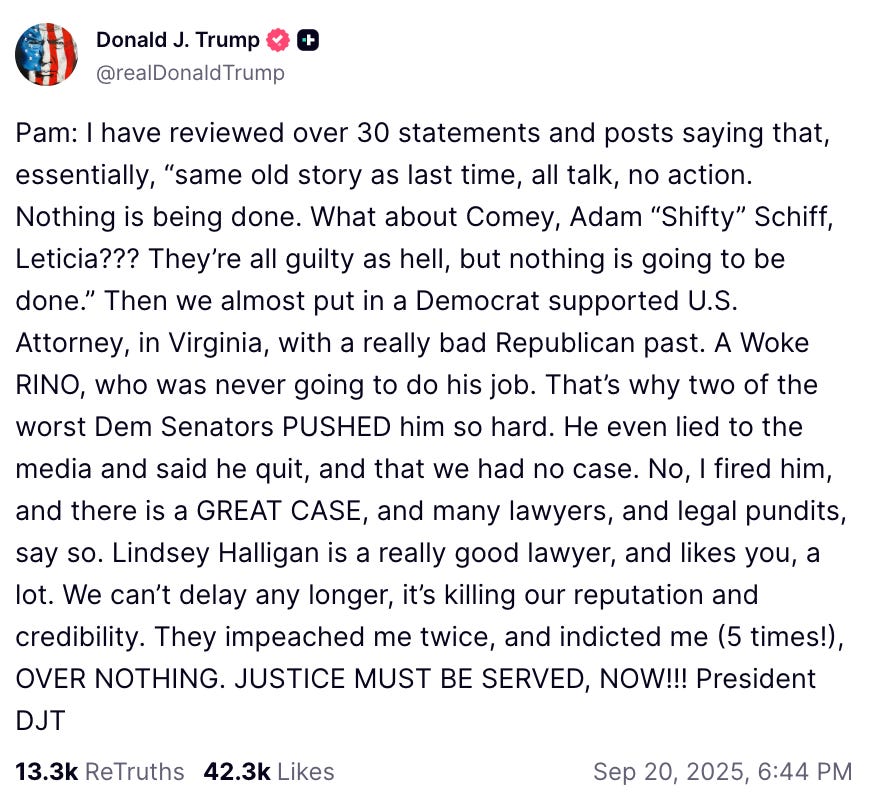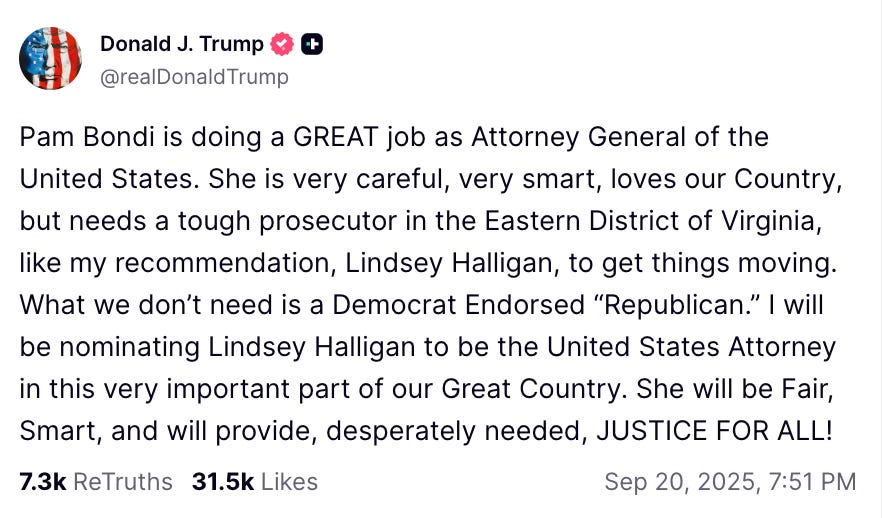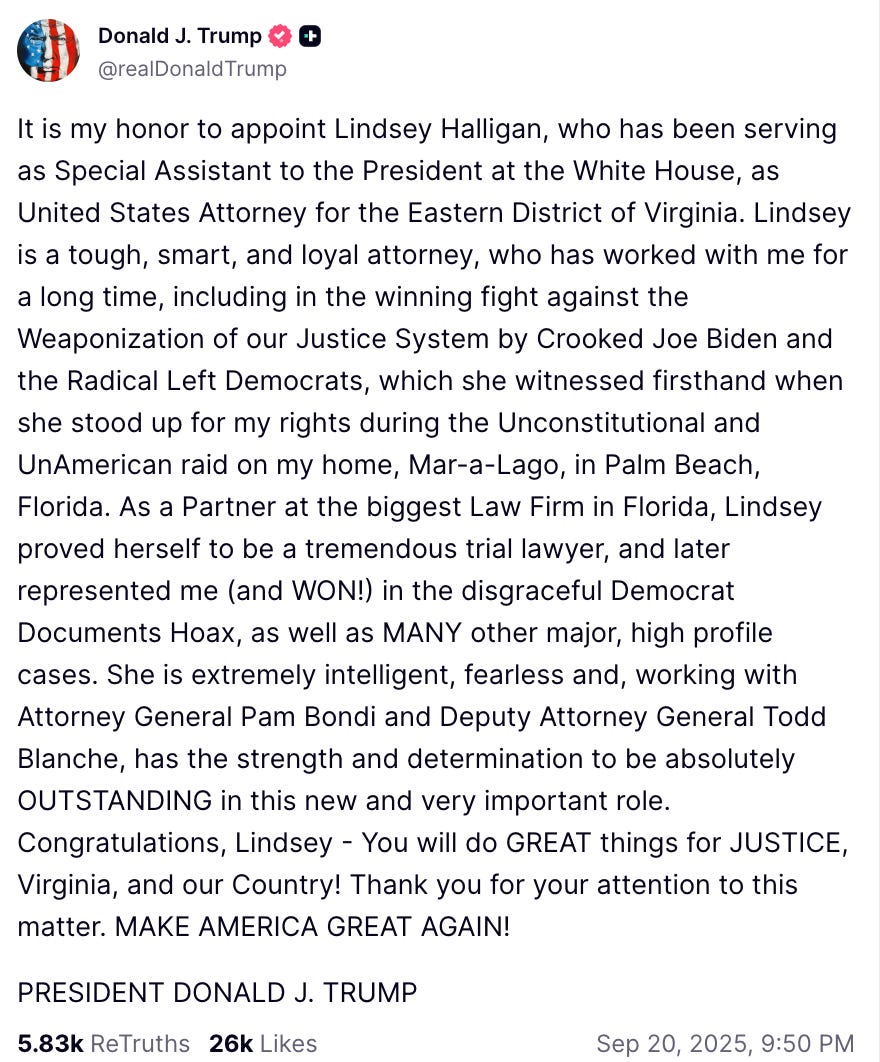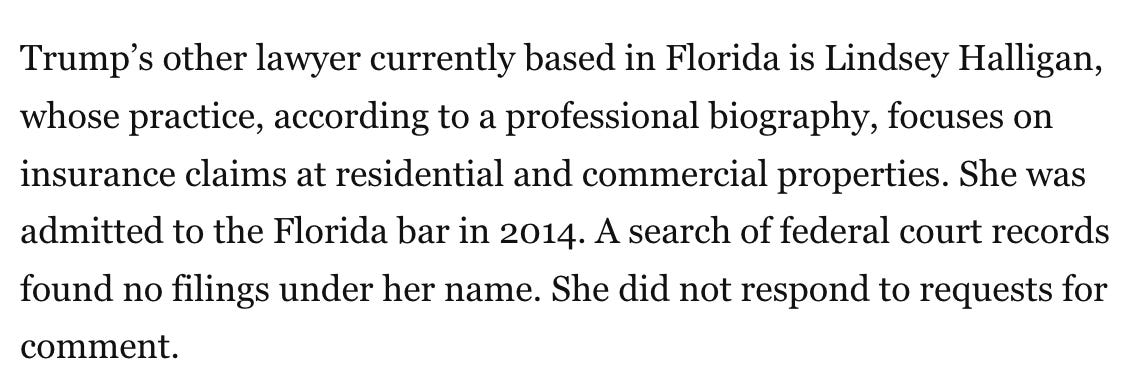A sharp picture of the personal nature of Trump's disregard for the rule of law
Allegations against Trump's "border czar" and DOJ, TikTok shenanigans, and Trump's Virginia federal prosecutor manipulations. And, for paid subscribers: Closing my tabs.
The lawless actions of the Trump administration have been on stark display this weekend in ways that highlight how that lawlessness is used to personally benefit President Donald Trump, his allies, and his political goals.
The weekend’s lawlessness came following a week that featured an unending attack on the First Amendment and freedom of expression paired with continued capitulation by both other branches of government and so-called titans of industry.
And yet, the clown-car incompetence of the Trump administration, combined with their insistence on overstepping at every point, has put roadblocks in their path to Trump’s fascist goals and made it easier for his opposition to gain a foothold across the nation.
Trump and his policies are more unpopular by the day. People — including those with authority — need to say so, loudly, and act accordingly.
As Pete Buttigieg put it, directly and simply:
Nonetheless, the display of lawlessness for political and personal ends this weekend has been alarming, even for this administration. It is key to see and understand — both to know what is going on, but also to understand how to push back.
Three stories from this weekend alone — one uncovered this weekend, another that has been moving along throughout the year, and a final one still developing — show the breadth of how Trump’s efforts to subvert the rule of law are connected to his political and personal aims.
In a story alleging that the Justice Department shut down an investigation of Trump “border czar” Tom Homan despite the FBI having earlier recorded Homan “accepting $50,000 in cash” from agents “posing as business executives,” veteran journalists Carol Leonnig and Ken Dilanian reported at MSNBC:
Shortly after Trump’s inauguration, however, in either late January or February 2025, former acting Deputy Attorney General Emil Bove was briefed on the case and told Justice Department officials he did not support the investigation, according to two people familiar with the case.
Bove took a seat on the U.S. Court of Appeals for the Third Circuit — despite being entirely inappropriate for a judicial role — on September 2, the fifth judicial nominee confirmed in Trump’s second term.
And Homan continues to be one of the most toxic men in Trump’s inner-orbit — and that’s saying something.
If the MSNBC report is correct, this is a pretty blatant story of Trump’s people using the law to protect Trump’s people.
Also over the weekend, news has emerged, piece by piece, about Trump’s plans to have his right-wing allies control the ownership of TikTok in America. This would, of course, be alarming on its own. In the context of Trump’s actions thus far on this matter, however, it presents another example of Trump running roughshod over the rule of law to reach his preferred outcome.
Under a law passed by Congress in 2024, which the U.S. Supreme Court unanimously upheld against a First Amendment challenge earlier this year, TikTok would have been effectively banned as of mid-January. Under the law, the president was authorized to give one 90-day extension before the ban went into effect — and, even then, only if he determined “significant progress” toward a sale had been made.
Trump did no such thing. Instead, and since his first day back in office, Trump has simply ignored the law — with Attorney General Pam Bondi backing him with a claim that Trump has the constitutional authority to ignore the law and allow TikTok to keep operating. Trump has continued with this lawlessness, apparently until he could convince his allies to buy it.
This, then, appears to be a case of Trump using (or, more specifically, ignoring) the law to manipulate the market — and, ultimately, exert further control over public discourse.
The final development is one of Trump seeking to use the law to go after those who are not his people.
Following Friday’s ouster of Erik Siebert as U.S. Attorney for the Eastern District of Virginia, Trump made his larger plans perfectly clear. Although Siebert resigned, there had already been reporting that Trump wanted to fire him due to his refusal to issue politically motivated indictments where he found no evidence to support such indictments.
On Saturday evening, as Kyle Cheney reported, Trump published a post on Truth social directed to “Pam” — Bondi — in which he claimed to have fired the unnamed Siebert; suggested it was because he “said … that we had no case,” after having referenced targets of his retributive ire, including former FBI Director James Comey, Sen. Adam Schiff, and New York Attorney General Letitia James; and wrote that “Lindsey Halligan … likes” Bondi “a lot,” in telling Bondi, “We can’t delay any longer ….”
It was not clear, first of all, whether this initial message was supposed to be public. Trump deleted the first post, which lacked Halligan’s last name. It had, of course, been noted and screen-grabbed, so — regardless of whether it was intended to be public — he then re-posted:
An hour later, suggesting a clean-up move after the prior two posts, Trump posted a third time to say that Bondi is “doing a GREAT job” and that he “will be nominating“ Halligan, another of his former personal lawyers, to be the U.S. Attorney for the Eastern District of Virginia:
Two hours after that, in a fourth post, Trump claimed that he was “appoint[ing]” Halligan “as” U.S. Attorney for the Eastern District of Virginia, although he can’t do that.
Under federal law, there are three possible steps (aside from Senate confirmation) for filling a U.S. Attorney vacancy. Bondi could name Halligan as U.S. Attorney for 120 days under one federal law specific to such vacancies. Alternatively, under the Federal Vacancies Reform Act of 1998, the First Assistant in the office would automatically “perform the functions and duties of the office temporarily in an acting capacity“ once the vacancy occurred or Trump could name certain people within the Department of Justice — which would not include Halligan — as the acting U.S. Attorney.
In short, none of those three permit Trump to appoint Halligan to be U.S. Attorney without Senate confirmation. And, as this Washington Post report from 2022, when she first appeared on Trump’s legal team after the Mar-a-Lago raid, suggests, Halligan is not in any way qualified to run any U.S. Attorney’s Office, let alone one home to some of the most significant national security cases in the country:
As of Sunday evening, the Justice Department’s website provided no clarity, as Siebert was still listed as running the office.
Despite how alarming these developments are, I do want to note how these stories also highlight that telltale incompetence paired with overstepping: An ally allegedly accepted cash from undercover agents but DOJ dropped the case when Trump returned to office, Trump and Bondi are blatantly ignoring a federal law until Trump finds the right scheme to benefit himself and his aims, and a night of Trump posting repeatedly about his explicit aims for vengeance prosecutions.
These are actions that raise alarm bells to any rational person — even the most casual of observer — when they are presented with the facts.
Closing my tabs
For those who don’t what this is, it’s my effort to give a little thank you to paid subscribers. “Closing my tabs” is, literally, me looking through the stories and cases open — the tabs open — on my computer and sharing with you all some of those I was unable to cover during the week but that I nonetheless want to let you know that I have on my radar. Oftentimes, they are issues that will eventually find their way back into the newsletter as a case discussed moves forward or something new happens that provides me with a reason to cover the story more in depth.
This Sunday, these are the tabs I am closing:



